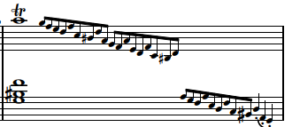This well-loved piece was never published in the lifetime of the composer.
Characteristics:
Key: C# Minor
Instrument: Piano
Players: Single player
Time signature: None written
Measures/Bars: 138
Fontana’a first edition gave it the name “Fantaisie” and “Opus 66”, while Paderewski numbered it as the 4th Impromptu
Numerous theories have been put forward, but the real reason will probably never be conclusively determined.
Some of the most commonly considered reasons are below:
1) Identical parts to Beethoven’s Moonlight Sonata 3rd movement
This applies to the RH portion in Bars 7-8(and repeated multiple times later) of Fantaisie Impromptu, and Bar 188 of Moonlight Sonata 3rd Movement.
There are also other similarities, such as starting and ending with C# minor with a middle section in D♭ major.
Bar 188 of Moonlight Sonata 3rd movement(treble/bass CLEF)

2) Structurally similar to the Impromptu in Eb major op.89 by Ignaz Moscheles
Released in 1827, Moscheles was a well regarded composer during that era. Chopin, who was only in his early twenties then, may well have attempted to improve upon Moscheles’ work, intending it to only be performed privately amongst his private circle and not slight Moscheles publicly. In his lifetime, Chopin performed together with Moscheles before the French royal family as well as contributed the Trois nouvelles études to Moscheles “Méthode des méthodes de piano” book.
Impromptu in Eb major by Ignaz Moscheles
3) Sold to the Baroness D’Este
At an auction of the Estate of the Baroness Sarah Frances D’Este in 1955, the legendary pianist Artur Rubinstein came across a 1835 manuscript which indicated that the piece had been composed for the baroness, and hence sold to her.
4) Did not meet his standard for music intended for publication
The composer himself may not have thought the way the masses did. Just like Beethoven would have hardly considered Für Elise one of his best compositions, Chopin may simply have decided not to publish this. The number of known works by Chopin and their relative quality is reflective of the composer’s own standards. As such, it is certain that there have been other pieces lost forever which the world might otherwise have loved.
